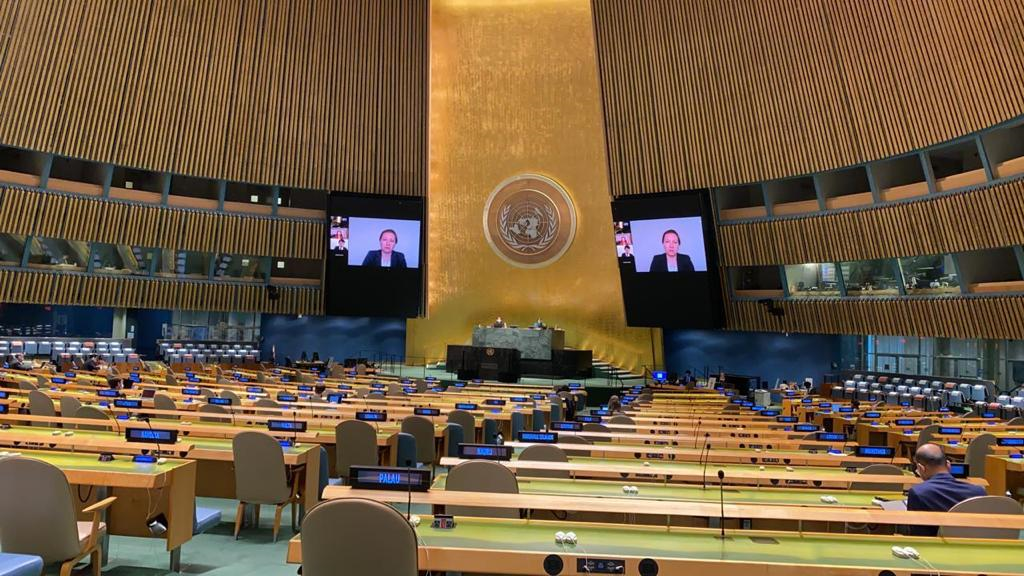Statement by Director of Department for Multilateral Economic Cooperation and Special Projects of Ministry of Economic Development of the Russian Federation Natalia Stapran at the Panel VI: Building the economy of the future that is climate-resilient and aligned with the SDGs, during the ECOSOC Forum on Financing for Development follow-up session
Distinguished Mr.Mizuno,
Distinguished colleagues,
I wish to greet all the participants of the ECOSOC Forum on Financing for Development and to express my gratitude for the granted opportunity to highlight the relevant Russian policies.
The COVID-19 pandemic has certainly slowed down the progress towards the Sustainable Development Goals and affected all aspects of the development financing. Amid the recession, tax revenues, trade, direct investment and remittances have declined. Sovereign debt burden has increased leaving countries more vulnerable to debt.
The SDGs funding was insufficient even before the crisis, but after the pandemic, according to the OECD estimates, the annual SDG financing gap in the developing countries could increase by another $ 1.7 billion.
The developing countries should continue to be assisted in establishing reliable and effective institutions for domestic resources mobilization as the soundest long-term source of the financing.
At the same time, we recognize the important role of the official development assistance and the necessity to meet the ODA commitments by donors. It is also essential to promote the inflows of the external financing to the developing countries.
We consider a contribution of private sector, including in the form of cross-border sustainable investments, to be crucial for the achieving the SDGs in all countries.
In this area, the most important challenge is to conciliate various approaches to and standards of financing sustainable projects in order to reduce the risks of unfair branding of financing as sustainable (“SDG-washing”), while developing transparent instruments, project taxonomies and verification tools. We support the respective ongoing activities and initiatives in the G20.
We note with deep concern that the pandemic has made achieving the SDGs and the Paris Agreement targets even more challenging, both globally and regionally.
The Russian approaches to the climate agenda, in particular to the low-carbon development, continue to evolve. A national low-carbon development strategy until 2050, legislation on regulation of emissions, is being developed. A pilot project on carbon emissions trading in some Russian regions aimed at achieving carbon neutrality is being prepared for implementation. A national green finance system is now under development.
We recognize the relevance of the basic Paris Agreement principles, goals and objectives. At the same time, we emphasize the integrity of the 2030 Agenda and its three dimensions - economic development, social wellfare and environment.
It is important to find such ways of addressing the climate challenges that do not restrain the development of countries, but allow simultaneously eradicate poverty, promote human and technological development and provide an access to safe and reliable energy. We believe that nuclear energy- high-tech, promising and at the same time low-carbon - could be one of solutions.
In Russia, we see the signs of the growing interest to the "sustainable" agenda from society, private and public sector.
We develop new platforms and mechanisms for dialogue with Russian companies, support their existing and new partnerships with multilateral organizations, and provide the expertise for exporters in the area of the OECD best standards of responsible business conduct.
Distinguished colleagues,
The 2030 Agenda is a universally recognized roadmap that indicates the most meaningful areas where resources for development are to be allocated. We must consider it comprehensively preventing the possible imbalances in favor of certain goals.
We note that the work on the Sustainable Development Agenda produces new rules, standards and regulatory requirements. We are confident that this process should be inclusive, and all countries should be definitely engaged in it.
I thank you for your attention.
